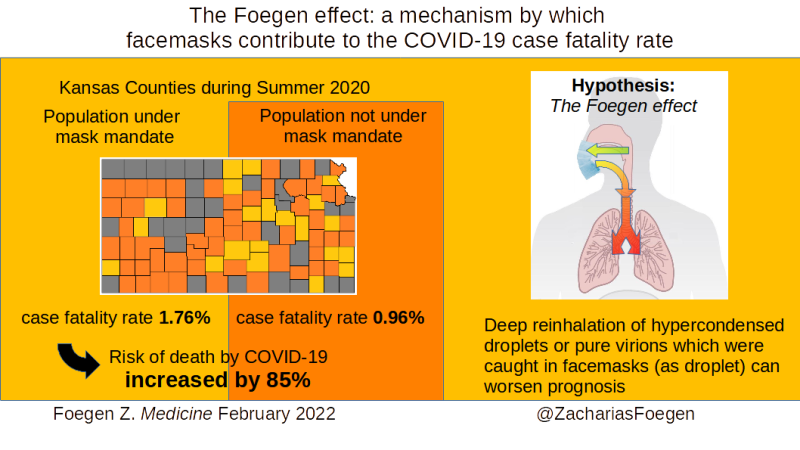It took a long time, but my study on masks has finally appeared in the prestigious journal Medicine. What is my study about?
It is about whether masks decrease case fatality from COVID-19 (because less viral material is transmitted) or increase it. Increase sounds illogical? Ask yourself if you would wear the mask of a Covid patient. You probably wouldn’t, otherwise you could become infected by inhaling the viruses he or she breathed into the mask.
My study, based on the U.S. state of Kansas, provides the answer: case mortality was significantly lower in counties without mandatory masks. Mandatory masking increased case mortality there by 85%. Even after factoring in the reduced number of cases due to masks, the numbers still remain 52% higher. Over 95% of this effect can only be attributed to COVID-19, so it is not CO2, bacteria or fungi under the mask.

The reason for this is what I call the Foegen effect: deep re-inhalation of condensed droplets or pure virions which were trapped in the mask as droplets can worsen the prognosis. Each of these steps has been documented in the literature.
This effect has now even been demonstrated in animal models. Further studies in humans comparing mask versus helmet or nasal tube show the same result.
Two other, even larger evaluations show the same effect on the case fatality rate. A peer-reviewed study in the journal Cureus shows that there is no association between mask compliance and case numbers in Europe, but there is a statistically significant positive association between mask compliance and deaths. This means: more mask use, same number of cases, but more deaths.
A peer-reviewed study by Adjodah et. al. analyses the effect of mask mandates on cases and mortality (but not case fatality rate) in the USA on a pre-post-basis, and finds that after the lifting of a mask mandate, cases rise but mortality does not, which effectively means that lifting a mask mandate lowers the case fatality rate. Conversely, the implementation of a mask mandate increases case fatality rate.
My study is open access and you can find it here – the PDF version (available via the download button in the left bar) is particularly recommended for its helpful layout.
The_Foegen_effect__A_mechanism_by_which_facemasks.60Republished from Daily Skeptic
Published under a Creative Commons Attribution 4.0 International License
For reprints, please set the canonical link back to the original Brownstone Institute Article and Author.









